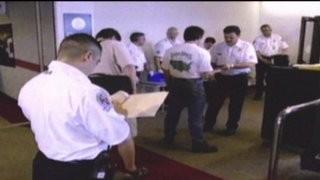WSVN — Immediately following the Sept. 11 attacks, the nation's skies went silent.
Mike Nonnemacher, Ft. Lauderdale-Hollywood International Airport: "That was, in my tenure in this industry, the eeriest moment I can recall, because for the first time in nearly 100 years the aviation system in the United States was shut down."
Mike Nonnemacher is the director of operations at Ft. Lauderdale/Hollywood International and was at the airport that Tuesday morning.
Mike Nonnemacher: "This was going to change the aviation industry, globally, forever."
In the attack's aftermath, toe nail clippers, nail files, and even tweezers, were considered potential weapons.
Lauren Stover, Miami International Airport: "It became national news when a tweezer was found in the cabin of an aircraft."
The job of making sense of what was and was not, a risk fell to a new agency created by congress. The Transportation Security Administration or TSA.
Mark Hatfield Jr., TSA Federal Security Director, Miami: "We learned on Sept. 11, that the threat had become far, far more dangerous and that the aircrafts themselves were turned into weapons."
Screeners were on the hunt for items that could be used to demand compliance in the cabin. This display case at TSA in Miami still contains the confiscated items from the past decade. Though frightening, Hatfield says the items are largely viewed as yesterday's risk.
Mark Hatfield Jr., TSA: "The greatest threat today is not a blade or even a handgun, it's an explosive device and that's really what our efforts are very largely focused on."
Thankfully, the few potentially devastating events over the years failed. There was Richard Reid, the shoe bomber, in 2001 and on christmas 2009 a Nigerian man was accused of trying to set off a bomb sewn into his underwear, but it was a 2006 plot that really raised eyebrows.
Official: "This was intended to be mass murder on an unimaginable scale."
Authorities say the plan was to target planes traveling from London to the U.S. using explosives concealed in sport drink bottles.
Mark Hatfield Jr., TSA: "Fortunately, it was a disrupted plot, but it led to what we've now lived with in terms of those, keep your liquids in the zip lock bag and no more than 3.4 oz."
TSA Has not been controversy free over its existence. Critics have said body scanners are an invasion of privacy, but TSA responded. MIA now using new technology that displays a simple generic illustration.
Passenger: "If you touch my junk I'm going to have you arrested."
And of course, there was the pushback against patdowns.
Mark Hatfield Jr., TSA: "I think that sometimes TSA bashing has become a spectator sport in this country, but I think people understand what we do, we do for a very good reason."
The future of security includes more behavior based screening and risk analysis.
Lauren Stover, Miami International Airport: "We will be able to screen people appropriate to the level of risk they pose to us."
And each day as passengers come and go there's the layers of security that remain invisible.
Federal Air Marshals, specially trained armed pilots and lots of cameras, more than one thousand at MIA alone, but even 10 years later officials say nothing is foolproof.
Mark Hatfield Jr., TSA: "When people say, is it 100 percent safe, or is it 100 percent impenetrable, I think the honest answer is no. We have a level of risk that we accept, that we know exists every single day with every flight that takes off."
And with every plane that takes off comes a quiet reminder of the four that would never land safely on that September morning in 2001 and the message to never forget.

